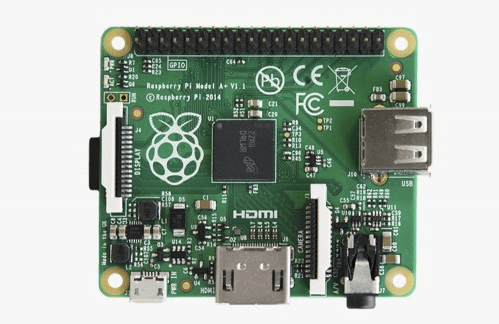The Raspberry Pi low cost Linux microcomputer which has fired up a cottage industry of makers and hardware tinkerers since hitting the market in early 2012 — even enabling multiple Pi-powered startups — just got even cheaper.
The Raspberry Pi Foundation has announced an updated version of its Model A board, called the Model A+, along with a $5 price drop to just $20. The new Model A board is also smaller and more energy-efficient than its predecessor.
Raspberry Pi co-founder Eben Upton confirmed an A+ was coming soon in an on stage interview at Disrupt Europe last month.
Other improvements in the Model A+ are more GPIO, with 40 pins now on offer, a micro SD card slot replacing the SD slot, and improved audio. The additional GPIO means the A+ is compatible with the new Hardware Attached on Top standard for Raspberry Pi add-on boards. Some stuff on the A+ hasn’t changed: there’s still only a single USB port, no Ethernet and 256MB of RAM.
The Foundation recently rebooted its Model B board with a B+ update, which also expanded the capabilities and flexibility of the board but maintained the $35 price-tag. It’s taken some of that work and applied it to the A+, noting that the latter “inherits… many improvements that we made to the Model B+”.
Shaving a further $5 off the price of the Model A+ is undoubtedly the most exciting development here. The Foundation dubs it “pretty mind-bending” to get the price down to $20 while continuing to manufacture the board in the U.K.
Price aside, the Model A+’s smaller size is also likely to get makers thinking caps’ smoking, given it will be possible to squeeze it into more places.
In an interview with Linux Voice discussing the new Model A+, Upton said the original Model A board has been somewhat overlooked, given there was only $10 between that and the more powerful Model B/B+ many people opted for the latter by default. But he argues the lower energy consumption of the Model A board means it can be a better choice for certain types of projects.
In other words, less is sometimes more. And (microcomputer-powered) horses for courses.
“It’s easy for people to look at the Model A and think it’s just a cheaper variant of the B. When they look at it like that they might as well just go for the deluxe model since it’s only an extra $10,” Upton told Linux Voice. “I feel like some people missed out on why the lower-power model like the Model A can make sense. If you’re building something with robotics, or essentially any project that doesn’t need Ethernet networking, it’s a great fit.”
Upton also reveals that Google’s Eric Schmidt played a role in squeezing the Model A price-tag down to $20, telling him to “try and be as cheap as possible… try and get as close to free as you can”.
Mountain View’s interest in Pi extended to giving the Foundation a $1 million grant last year to fund 15,000 Pis for U.K. schoolkids to help them learn to code.
